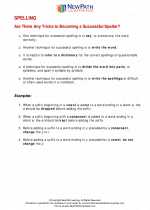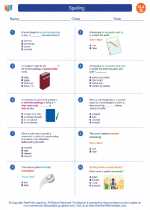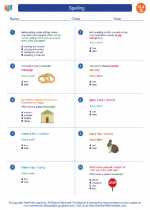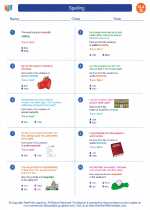Spelling Study Guide
- Word Lists: Start by creating a list of words that you find challenging to spell. Review and practice these words regularly.
- Phonics and Patterns: Understanding phonics and word patterns can help you spell unfamiliar words. Practice identifying common patterns and sounds in words.
- Root Words: Learn the meanings and spellings of common root words. Understanding roots can help you spell and understand new words more easily.
- Prefixes and Suffixes: Study common prefixes and suffixes and how they affect the spelling of words. Knowing these can aid in spelling and understanding word meanings.
- Etymology: Study the origins of words. Knowing the history of a word can provide clues to its correct spelling.
- Use Resources: Utilize dictionaries, spell-checkers, and other resources to verify the correct spelling of words.
- Practice, Practice, Practice: Regularly practice spelling words through writing, quizzes, and flashcards. Repetition is key to mastering spelling.
[Spelling] Related Worksheets and Study Guides:
.◂English Language Arts Worksheets and Study Guides Seventh Grade. Spelling
Study Guide Spelling
Spelling  Worksheet/Answer key
Worksheet/Answer key Spelling
Spelling  Worksheet/Answer key
Worksheet/Answer key Spelling
Spelling  Worksheet/Answer key
Worksheet/Answer key Spelling
Spelling 

 Worksheet/Answer key
Worksheet/Answer key
 Worksheet/Answer key
Worksheet/Answer key
 Worksheet/Answer key
Worksheet/Answer key

The resources above cover the following skills:
Students apply knowledge of language structure, language conventions (e.g., spelling and punctuation), media techniques, figurative language, and genre to create, critique, and discuss print and nonprint texts. (NCTE)